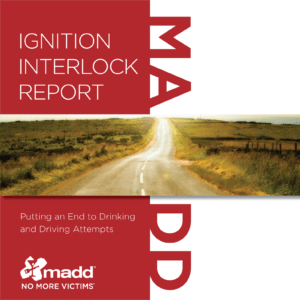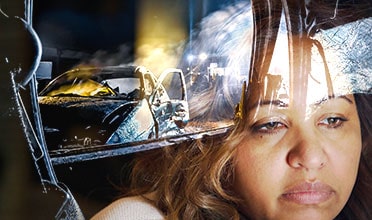Ignition Interlocks Stopped 3.78 Million Drunk Driving Attempts in Past 14 Years
WASHINGTON — Mothers Against Drunk Driving (MADD) released a 50-state report today on the number of times ignition interlocks have stopped drivers from starting their vehicles while drunk and assigned a grade to each state based on their ignition interlock laws. The average state grade is an F. Arizona and New Mexico obtained the highest grade of an A-.

Over the past 14 years, ignition interlocks have stopped 3.78 million drunk driving attempts by a driver with at least a .08 blood alcohol concentration (BAC). The report notes that ignition interlocks are underutilized in states with weak laws or loopholes that allow drunk drivers to avoid them.
Ignition interlocks are small “in-car breathalyzer” devices connected to a vehicle’s ignition that block the engine from starting if a pre-set level of alcohol is detected on the driver’s breath. The devices require the driver to blow into a mouthpiece, unlike the passive technology being developed for future cars as part of the Infrastructure Bill passed last year. Currently, 34 states and Washington, D.C., require ignition interlocks for all drunk driving offenders.
“MADD has known for a long time that we need technology to step in when people refuse to make the right choice to never drink and drive,” said MADD National President Alex Otte. “This report is proof that ignition interlocks work to stop people who have already driven drunk from repeating their dangerous choice. MADD is thankful for the lives saved and injuries prevented because these devices stopped someone who was drunk from driving.”
MADD advocates for every state to pass and enforce laws that require ignition interlocks after the first offense and for at least six months. The time using an ignition interlock allows drunk driving offenders to drive to work and continue with their daily lives as long as they don’t try to drive drunk again. Blocked attempts to start a vehicle enforce safe driving behavior while also protecting communities.
The MADD report assigns a letter grade to every state based on nine criteria regarding their current laws, including who is ordered to use an ignition interlock and timing of that order, when the interlock can be removed and affordability. The grades are intended to encourage action in state legislatures to improve drunk driving laws, recognizing that prosecutors, law enforcement, highway safety officials and many others are committed to implementing current ignition interlock laws to keep their communities safe.
The ignition interlock stop data was collected from ignition interlock companies across the nation and shows more than 390,000 drunk driving attempts were prevented in 2020 – an average of 1,069 drunk driving attempts a day.
“The number of stops is incredible, especially considering that ignition interlocks are not being used at every opportunity possible,” Otte said. “However, as detailed in our report, too many loopholes exist in state laws that allow drunk drivers to avoid using an ignition interlock. If every offender was ordered to use one, so many more tragedies could be prevented.”
For the full report and more information visit madd.org/iidlaw.
About Mothers Against Drunk Driving Founded in 1980 by a mother whose daughter was killed by a drunk driver, Mothers Against Drunk Driving® (MADD) is the nation’s largest nonprofit working to end drunk driving, help fight drugged driving, support the victims of these violent crimes and prevent underage drinking. MADD has helped to save more than 400,000 lives, reduce drunk driving deaths by more than 50 percent and promote designating a non-drinking driver. MADD’s Campaign to Eliminate Drunk Driving® calls for law enforcement support, ignition interlocks for all offenders and advanced vehicle technology. MADD has provided supportive services to nearly one million drunk and drugged driving victims and survivors at no charge through local victim advocates and the 24-Hour Victim Help Line 1-877-MADD-HELP. Visit www.madd.org or call 1-877-ASK-MADD.
Contact: Becky Iannotta, 202.600.2032, [email protected]





